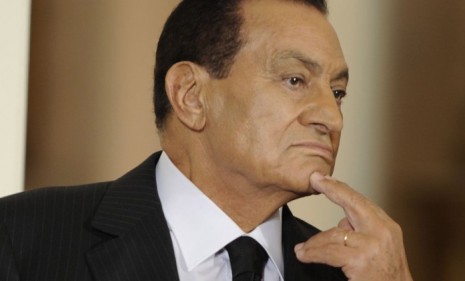How long can Egypt's Mubarak last?
As the Tunisian-inspired protests in Egypt continue, can the country's strongman president withstand popular calls for his ouster?

A free daily email with the biggest news stories of the day – and the best features from TheWeek.com
You are now subscribed
Your newsletter sign-up was successful
Egypt's anti-government protests continued on Thursday, further intensifying speculation that longtime President Hosni Mubarak could fall, as his Tunisian counterpart did after similar unrest. The authoritarian Mubarak, who has held power for nearly 30 years, is fighting back by declaring all protests illegal and banning Facebook and Twitter, which protesters have used to coordinate their movements. And, "against all evidence," he has attempted to pin the uprising on the Muslim Brotherhood, an opposition party he has demonized for two decades. But with the uprising continuing, and with the former head of the International Atomic Energy Agency, Mohamed ElBaradei, ready to lead for a transitional period if necessary, can Mubarak hold onto power? (Watch an al Jazeera report about the protests)
Egypt is not the same as Tunisia: It's possible that Egypt could follow Tunisia's lead, says Michael Bell at the Toronto Globe and Mail, but the two cases are different. "Egypt is corrupt, but the Mubarak family doesn't share the odor of decay" that enveloped the clan of Tunisia's ousted iron-fisted leader, Zine El Abidine Ben Ali. And another "factor of great significance" is that "Tunisia's military defied orders to fire on the crowds," avoiding serious bloodshed, while Egypt's troops are showing no signs of restraint.
"Will Egypt go the way of Tunisia?"
The Week
Escape your echo chamber. Get the facts behind the news, plus analysis from multiple perspectives.

Sign up for The Week's Free Newsletters
From our morning news briefing to a weekly Good News Newsletter, get the best of The Week delivered directly to your inbox.
From our morning news briefing to a weekly Good News Newsletter, get the best of The Week delivered directly to your inbox.
Mubarak has the right friends: The protests rage on, says Jon Leyne at BBC News, but "so far they have not risen to a level to threaten President Hosni Mubarak." That's partly because "the West, and many powerful and rich people here have a big investment" in keeping the president powerful. If he is thrown out, those allies will want "an orderly transition to another leader friendly to the West and to business," which is certainly not a given. In any case, events are moving so fast no one can predict what's next.
"Egypt protests: Can Mubarak be toppled?"
He can still salvage his government: The situation in Egypt is "delicate," says The New York Times in an editorial, but Mubarak still has a chance to "steer his country on a stable path without sacrificing it to extremist elements." He can accomplish this by "ordering security forces to exercise restraint against the protesters and — even more importantly — quickly offering Egyptians a credible, more democratic path forward." The Obama administration can help by urging Mubarak to "accept the legitimacy and urgency behind the protests." Ultimately, "a peaceful transition would be best for everyone."
"Mr. Mubarak is put on notice"
A free daily email with the biggest news stories of the day – and the best features from TheWeek.com